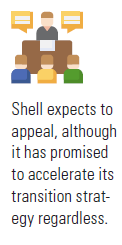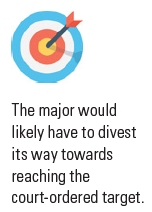Shell to fast-track transition plans after Dutch ruling [Gas in Transition]
Shell has pledged to step up efforts to reduce its emissions in the wake of a landmark ruling by a Dutch court last month that the Anglo-Dutch major is not doing enough to tackle climate change..png)
Shell has set among the most ambitious targets out of the international oil companies (IOCs), vowing to reduce the net carbon intensity of its products by 6-8% by 2023, 20% by 2030, 45% by 2035 and 100% by 2050, using emissions in 2016 as the baseline. However, the court at the Hague ruled on May 26 that Shell’s goals fell short of Paris Agreement alignment. It ordered the producer to make a steeper 45% reduction to its Scope 1, 2 and 3 emissions, and using the higher level in 2019 as the baseline.
Shell’s existing strategy is “not concrete and is full of conditions ... that’s not enough,” Judge Larisa Alwin said. “The conclusion of the court is therefore that Shell is in danger of violating its obligation to reduce.”
.png) Critically, the target mandated by the court applies to absolute emissions, while Shell’s own targets relate to net carbon intensity. By focusing on intensity, companies can still expand production even while reducing their emissions. In its current strategy, Shell projects that its oil production will gradually diminish by 1-2% each year between now and 2025, as a result of divestments and natural decline. But the company projects that it will boost LNG production by 7mn metric tons/year by the middle of the decade.
Critically, the target mandated by the court applies to absolute emissions, while Shell’s own targets relate to net carbon intensity. By focusing on intensity, companies can still expand production even while reducing their emissions. In its current strategy, Shell projects that its oil production will gradually diminish by 1-2% each year between now and 2025, as a result of divestments and natural decline. But the company projects that it will boost LNG production by 7mn metric tons/year by the middle of the decade.
Shell has said it will likely appeal the ruling. But CEO Ben van Beurden noted in an article on June 9 that it had been informed by the court that the decision applies immediately and should not be suspended pending an appeal.
“We are carefully reviewing the court’s judgement and the challenges it presents, and we expect to appeal,” the company boss said. “Some two weeks on, I still feel disappointed that Shell is being singled out by a ruling that I believe does not help reduce global CO2 emissions.”
Van Beurden said the ruling nevertheless meant “an acceleration” of Shell’s strategy, without disclosing details..png)
“We will seek ways to reduce emissions even further in a way that remains purposeful and profitable,” he said. “That is likely to mean taking some bold but measured steps over the coming years.”
Van Beurden’s words could be taken to mean Shell is not holding out hope for a successful appeal. Alternatively, Shell may recognise that due to the publicity generated by the ruling, it will have to make some more concessions even if its appeal succeeds.
The company would very likely have to divest its way towards reaching the target, if it is upheld. Reuters reported on June 14 that Shell was considering the sale of its operations in the Permian shale basin, which yielded the company 193,000 barrels of oil equivalent/day last year. The news agency said the assets could fetch as much as $10bn.
Like other IOCs, Shell is on a divestment drive anyway to free up cash and pay down debt. In late May it agreed to divest its 90,000 b/d Mobile refinery in Alabama to Houston-based group Vertex Energy. It is also seeking a buyer for its onshore oil business in Nigeria.
Shareholder revolts
The Shell ruling is by no means an isolated event, and comes amid a rising wave of antipathy towards oil and gas. Increasingly, IOCs face calls from investors and authorities to simply dump their oil and gas assets rather than focus on eliminating their emissions using technologies such as carbon capture and storage (CCS) and hydrogen energy.
Besides authorities, IOCs are also under increasing pressure from their shareholders. On the same day at the Dutch ruling, a small activist investor called Engine No.1 succeeded in getting two nominees elected to ExxonMobil’s board. Engine No.1 later installed a third nominee in early June.
Engine No. 1 controls a mere 0.02% interest in Exxon, but succeeded in convincing pension funds including CalPERS, CalSTRS and the New York State Common Retirement Fund in supporting its nominations. The investor accuses Exxon of using CCS as a “prop to win shareholder votes,” saying it is not “a substitute for dramatically reducing conventional fossil fuel usage.”
Engine No.1 also says the carbon capture developed by Exxon is not advanced enough to address Scope 3 emissions from the use of its products. It dismissed Exxon’s $100bn carbon capture project in the US as “vapourware.”
Meanwhile at Chevron, shareholders voted almost 61% in favour in May of forcing the major to slash its Scope 3 emissions, although the resolution does not set a timeline for reductions.
Shell’s shareholders so far remain on side, voting overwhelmingly in favour of the company’s energy transition strategy in May. But it too has had to see off a rebellion from a minority of investors. While its climate strategy won 88.74% of shareholder support, over 30% also backed a second resolution filed by activist group Follow This, which called for the major to set binding targets for reducing emissions and winding down oil and gas production.
Beyond planned emissions reductions, Shell’s strategy also shifts the focus of its investments away from oil and gas and towards renewables and other low-carbon technologies. It has reorganised its annual capital spending into three pillars named Growth, Transition and Upstream. Some $5-6bn will be injected annually into Growth, including $3bn in marketing and $2-3bn in renewables and energy solutions, while $8-9bn will be allocated to Transition, constituting $4bn on integrated gas and $4-5bn in chemicals and products. Just $8bn will be left for Upstream, representing an historical low for the company.
Shell is looking to grow power sales to 560 TWh annually by 2030, establish positions in hydrogen and biofuels, and scale back the number of downstream sites it operates. In addition, it will seek access to a further 25mn mt/yr of CCS capacity by 2035. The company is already involved in CCS schemes in Norway, the Netherlands and the UK.
A precedent?
The industry’s fear is that the Dutch ruling sets a precedent that could lead to similar lawsuits cropping up against producers in multiple other jurisdictions.
“This ruling will definitely set a precedent that may be used in cases against other companies that are responsible for greenhouse gas emissions, but also in cases where a parent company is asked to exert its influence over its group companies as far as their activities are concerned,” partners at European law firm Fieldfisher tell NGW. “This may relate to environmental issues, but also to other areas affecting human rights, such as child labour.”
Should Shell fail to adhere to the ruling, it may have to pay financial damages, the partners say. However, it is “definitely conceivable” that the appeals court might reach a different conclusion in the case, they say.
Shell’s share price notably saw little movement after the ruling was announced, which Norwegian consultancy Rystad Energy cited as evidence that its significance may be exaggerated.
 “As shareholders kept their calm, I conclude that the news have little relevance for the actual business and the significance of this ruling could be somewhat exaggerated,” Rystad’s head of shale research, Artem Abramov, says. “If we are to hypothesise that Shell is set to deliver on the court decision, this can be done quite easily by portfolio optimisation and a dedicated divestment programme for high-emission assets.”
“As shareholders kept their calm, I conclude that the news have little relevance for the actual business and the significance of this ruling could be somewhat exaggerated,” Rystad’s head of shale research, Artem Abramov, says. “If we are to hypothesise that Shell is set to deliver on the court decision, this can be done quite easily by portfolio optimisation and a dedicated divestment programme for high-emission assets.”
Shell already has very competitive Scope 1 emissions, Abramov says, and divesting certain projects in the Middle East, Nigeria and Malaysia and a few other countries would likely be the easiest way for the major to comply with the court decision.
“However, other than setting a precedent, there are no immediate implications for the general oil industry,” he says. “Even if Shell divests high emission assets, they will just change hands, not be taken off the global energy map.”
Per Magnus Hysveen, head of analysis at Rystad, believes the ruling has only a “negligible” chance to survive appeals.”
“It is hard to imagine a final ruling that will condemn oil companies for end use emissions,” he says. “E&P companies might one day be held liable for high or unnecessary emissions from the oilfields, but this is more difficult to happen for emissions by cars. End user emissions should be more of a consumer’s responsibility.”



